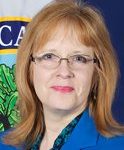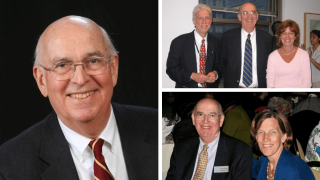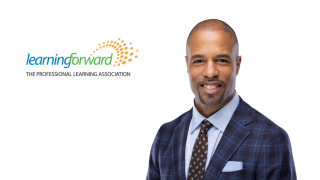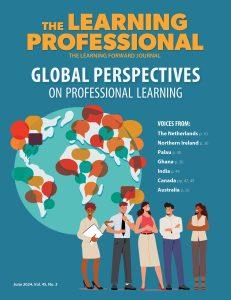As a member of Learning Forward’s PD Redesign Community of Practice, Riverside Unified School District is seeking a systematic way to evaluate the impact of professional development on teachers in their district.
Since the PD Redesign Community convening at Learning Forward’s Annual Conference in National Harbor, Maryland in December, the team is focused on getting organized and communicating with key players. “We wanted to include the rest of the team at the very start after we returned from Maryland,” Superintendent Antonio Garcia said.
Presenting the vision
The first task was to bring the work of the team to an existing committee made up of teachers, school site administrators, staff developers and others from the district office—to present their vision and talk about the work to come and the expected outcome of the effort. They defined their goal as developing systems to assess teachers’ reactions to their professional learning and to measure the quality of the professional development offered, ultimately measuring its impact on teaching.
The initial reactions to the problem of practice within the district team were positive. “I think the group overall was excited to hear that we have a very specific problem of practice that is necessary and important,” Garcia said. The larger team appreciated being brought into the thinking at an early stage. They saw connections with other initiatives in the district and agreed that redesigning to solve a districtwide problem of practice has value.
At the same time, the group cautioned the team to think carefully about how the PD redesign work will fit in with other district priorities. They asked them to consider how this work aligns with the iPD initiative and to figure out how both programs can be implemented without creating unnecessary complications and redundancies.
Following this meeting, the district shared the vision and plan with many of the staff developers and specialists who provide professional development in the organization (about 50 people). This group heard about the vision and goals as well, and provided feedback to the team on things to consider and possible ways to go about meeting the goals. After this meeting, the team considered next steps. “Our original plan was to use an existing committee to help us work on the measurement problem of practice,” explained Brad Shearer, “but we elected instead to form, at least temporarily, an in-house working committee to help us tackle the first two goals in advance of the next convening.”
The smaller, in-house team is made of instructional specialists, staff developers and teachers on special assignment, in addition to others working at the district office. Initially, many teachers feared being out of their classrooms too much to do this work, but the district plans to expand the involvement of teachers over time. “We want to be sure that we have plenty of teachers involved,” Garcia said. This smaller team had its first meeting this past Friday, February 19th, and it went extremely well. The working group addressed two of the goals set by the team (ensuring PD quality and identifying key teacher competencies) and made good progress. Two more meetings are planned over the next two months to continue the work and strive to meet targets set by the team in advance of the May PD Redesign Community convening.
What’s working:
- Defining good professional learning. “We’ve had some conversation about the characteristics of quality PD (and got good feedback from our staff) though we still have more work to do in this area,” said Brad Shearer. The team believes that their specific, scheduled meetings help them to get more specific.
- Finding the team and making time. To help allay time challenges, the team has put 3-4 hour blocks on the calendar and identified the team that will help them move forward.
Biggest challenges:
- Timeline. The timeline seems a little bit aggressive, especially to the teachers. “We are a little bit conflicted: We want to be like the tortoise, to start off slow and go steady. But we also feel the urgency of the hare to just get in there and get it done,” Antonio Garcia said.
- Discovering our learning needs. Information presented at the convening in December was helpful. Still, “We don’t know what we need to know yet,” Garcia said, “because we are in the infancy stages right now.” The team has planned trips to Long Beach and Fresno, and is hoping to get some ideas from talking to professional learning leaders in those systems. They are also interested in materials and webinars that can be share by the rest of the community.
Celebrations:
- Expanding PD on the calendar. The district negotiated with the teachers’ union for teachers to come back two days earlier to participate in quality professional learning. One day will be spent in structured professional learning and the other is allotted for collaboration.
- Staffing. The district has secured funding to continue to have staff developers. This will enable the district to provide professional development that’s differentiated by site. The staff developers can also participate in collaboration, and each teacher can have a substitute twice in the year to work within their teams.
Team members: Steven Dunlap, Antonio Garcia, Darel Hansen, Rene Levario, Brad Shearer
Edit 3/14/16: Riverside Unified School District is a member of Learning Forward’s PD Redesign Community of Practice. Learning Forward serves as the hub and convener of 20 school systems seeking to solve authentic problems of practice through more effective professional learning.






